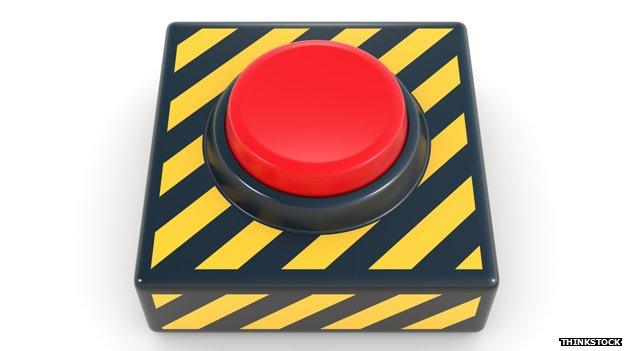Trigger warnings: What do they do?
- Published

A bit like a spoiler alert, the phrase "trigger warning" is now often seen online but it has a more serious motive than stopping you from accidentally ruining the enjoyment of a TV show you've not seen yet.
What is a trigger warning?
Seen on the web, in tweets and on blogs, it usually takes the form of a sentence or a few words to caution readers about the content which will follow. The author adds a warning in recognition of strong writing or images which could unsettle those with mental health difficulties. They exist so readers can choose whether or not to read any further.
It usually starts with "trigger warning" in bold. It has to be carefully written so it isn't a trigger itself.
TRIGGER WARNING - rather ironically, this article could be a trigger. If you feel your mental health could be affected by reading stories about how others can be affected, we advise you read no further.
So, what exactly is a trigger?
In the area of mental health, a trigger is something which causes instant distress in a vulnerable person. If you know what can trigger a bad reaction, you can try to avoid those triggers in the same way that someone with an allergy might take steps to avoid dogs.
What kind of things can act as a trigger?
Different things trigger trauma in different people. There is no set list.
The website for Young Minds, external youth mental health charity uses trigger warnings. A spokesman for the charity, Chris Leaman, says: "If they are feeling particularly vulnerable, illustrative bits of the site like personal accounts, might trigger young people into an action or remind them of a time when they were struggling."
A woman who wants to remain anonymous tells us that a recent news story about the search for a man who stopped someone from jumping off a bridge in London, was a trigger for her. She says: "What he was doing, raising awareness of suicide, was really great and so positive. But every time I crossed that bridge I thought of jumping off - it triggered suicidal thoughts for me."
Does everyone appreciate the warnings?
Writing in the New Statesman, Rhiannon Lucy Cosslett says she doesn't like trigger warnings, external because they smack of "victimhood". She says she has post-traumatic stress disorder (PTSD) and feels that people she doesn't know are trying to wrap her in cotton wool.
At the other end of the scale, the mental health charity Samaritans has produced guidelines for journalists, external which advise against publishing details of how people kill themselves. It also calls for dramatic phrasing to be avoided. Samaritans says reading about the subject can trigger copycat behaviour.
Where did trigger warnings start?
Disabled occupational therapist Claire Jones works in the area of mental health. She says that trigger warnings first appeared on feminist websites to flag up accounts of abuse. The term was adopted by various other groups, particularly the wider mental health community. This happened in the early days of the internet, when the warnings were especially common in online forums.
Viewers of Hollywood films portraying the lives of former soldiers will be used to scenes where characters experience flashbacks brought on by a loud noise, perhaps. Jones says: "A car backfiring can trigger a memory of conflict. It is a very visceral experience, almost like reliving the trauma."
Are trigger warnings ever considered unhelpful?
The thing about the internet is, if you use the word "trigger" it makes troubling content more findable because you can just type it into a search engine. Before the warning existed, "triggering" content, as it's referred to, was harder to find.
On some websites, users share pictures of their self-harm scars and write about their suicidal thoughts. They place trigger warnings in front so people can avoid this strong material.
Service user and mental health policy expert Liz Main says that "if someone is feeling particularly grim, they might search out triggers because they want a nudge". In other words, they might look for material which will inspire them to move from thinking about harming themselves, to actually doing it - which is obviously not positive.
Jones says online forums can be helpful and believes people with mental health difficulties are more likely to seek support if they know there are warnings which will prevent them from seeing traumatic material on their computer screen. She says: "That's why I think that trigger warnings are broadly a good thing."
Follow @BBCOuch, external on Twitter and on Facebook, external, and listen to our monthly talk show